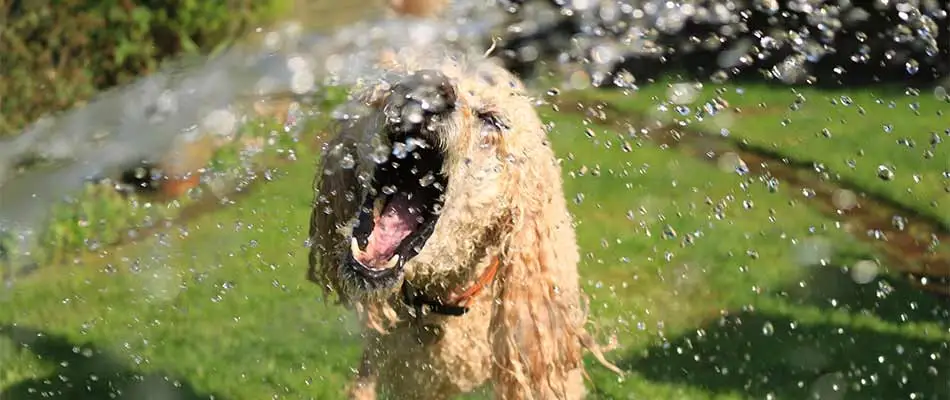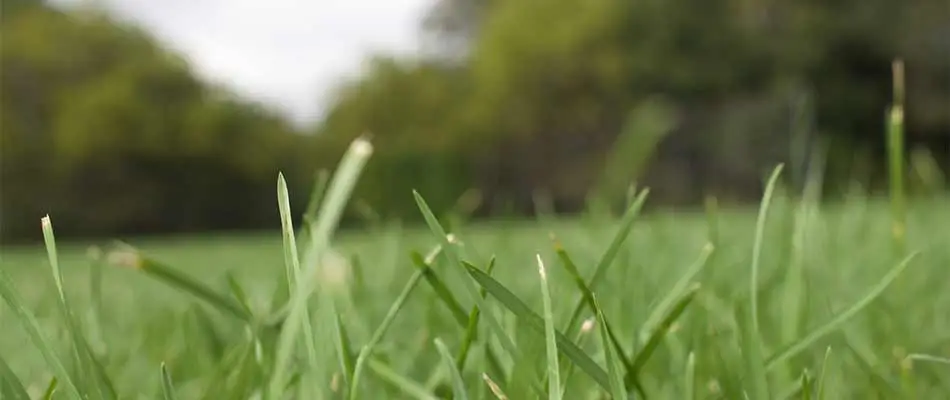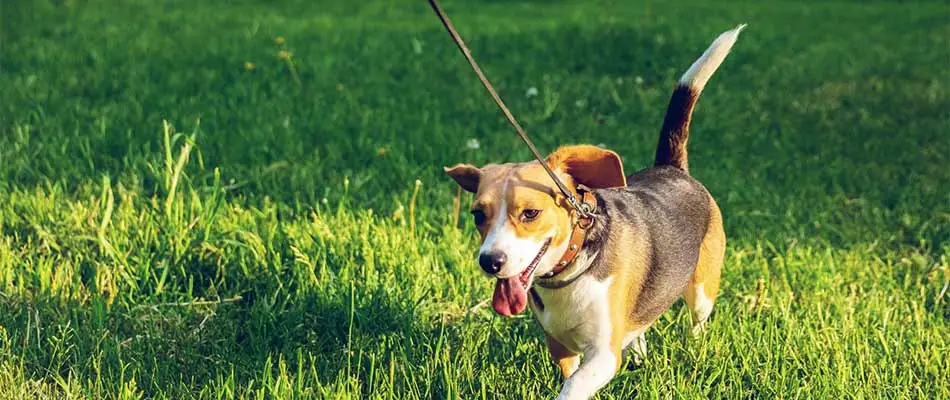It’s a fact: we Americans love our dogs. For many of us, dogs aren’t merely pets; they’re friends, companions, and even family members. Many people can’t imagine life without their canine companions, and sometimes human relationships get a little strained when one person is seen as making another person’s interests subordinate to a dog’s!
Okay, we’re not here to dive into the psychology of relationships between people and their pets/companions! What we are here to do is take a look at another fact, this time an unfortunate one: dogs and lawns aren’t so compatible on their own.
You know some of the obvious ones: solid waste, digging holes, and muddy paws. We don’t need to tell you all the ways dog poop is unpleasant and unhealthy, and we don’t need to tell you how frustrating it can be with holes dug in the lawn, dirt tracked inside the house, etc. Also, we don’t need to talk about the solutions to those problems because they’re also fairly obvious.
Instead, we want to look at two less obvious problems and whose solutions are less apparent to the average owner: the threat dog urine poses to a lawn and the dangers a lawn can pose to a dog.
We’re going to look at remedies, too, because we love dogs as much as you do, and we don’t see dogs and great lawns as an either-or choice. By the end of this, we hope you’ll have a better sense of how the two can coexist, and if you still have questions or need some help, we’ll be here!
Why Dog Urine is Bad for Your Grass in Sioux Falls, SD
- URINE HAS HIGH SALT LEVELS, AND SALT IS A KILLER FOR MOST GRASSES.
- URINE ALSO HAS HIGH NITROGEN LEVELS. NITROGEN IS TYPICALLY GOOD FOR THE GRASS, AND IT’S THE LEADING INGREDIENT IN MOST FERTILIZERS, BUT THOSE FERTILIZERS DELIVER YOUR LAWN THE NITROGEN IT NEEDS. EXCESSIVE NITROGEN IS HARMFUL.
- WHEN A DOG PEES ON THE LAWN, THE URINE IS IN A CONCENTRATED SPOT. BECAUSE IT ISN’T DISPERSED, THE URINE DEPOSITS TOO MUCH SALT AND NITROGEN THAN THAT SPOT NEEDS OR CAN HANDLE.
Remedies to Protect Your Lawn
At least with solid waste, you can be diligent about picking it up and removing it, but that isn’t so easy with urine! So now we’re going to cover several things you can do to protect your grass and other plants from the harmful effects of dog urine. After that, we’ll talk about repairing damaged spots, and finally, we’ll talk about protecting your dog.
Walk Your Dog as Frequently as Possible
One simple way to disperse dog urine so that it isn’t harming your glass or concentrated spots elsewhere is to walk your dog frequently and let it do its business in open spaces or designated dog-friendly areas. (Remember to be a good dog owner and pick up waste on trails, community spaces, etc.!) Walking the dog is also a great exercise for both you and your dog.
However, frequent walks don’t work for everyone for any number of reasons, and there are still going to be times that the dog has to go in the yard, so this is unlikely to be the only remedy you need to take.
Water Properly
With a lawn-care service or other expert advice, develop a watering schedule so that your lawn gets the moisture it needs regularly and at the levels it needs. Like the spot spraying we mentioned above, this helps dilute and disperse dog urine and its contaminants.
Use a Diet that Lowers Urine Ph Levels
A dog’s ideal urine ph is between 6 and 6.5; above 7, the urine can burn the lawn, and the dog can also experience harmful health effects such as bladder stones that result from alkaline urine. High-protein diets can also spell trouble because protein excretes nitrogen as it breaks down, making urine more damaging to grass.
Low-carb, grain-free diets reduce a dog’s urine ph levels. You can also easily check ph levels by purchasing strips that test urine. Since canine diets and testing dog urine are not our areas of expertise, we recommend talking with your veterinarian about these things. We know that diet can make a difference!
Make Sure Your Dog Stays Well Hydrated

A well-hydrated dog has decreased concentration levels of salt and nitrogen in its urine. Most people have just one water bowl somewhere in the house, but nothing stops you from putting some more around the house, especially if the house has multiple levels. This will encourage your dog to drink more frequently, which is good for both your dog and your yard.
Likewise, you can establish multiple hydration locations around the yard if the dog spends a lot of time outside. You can also add water to your dog’s dry food or add more moist food to its diet. Again, regarding dietary adjustments, please consult a veterinarian for specific guidance.
Plant Stronger Grasses
We live in a region that favors cool-season grasses, and you’re in luck because cool-season grasses hold up better under dogs. Tall fescue is a stronger grass that is better at withstanding dog urine. By being stronger, Fescues also endure foot traffic (including from dogs) and drought better than many other kinds of grass do. Kentucky bluegrass also holds up well under heavy foot traffic, and perennial ryegrass is good at shoring up trouble spots.
Protect Your Lawn

There are also many measures you can take to keep dogs out of sensitive areas and protect heavily used areas from damage.
Dogs are creatures of habit, and they establish preferred pathways in yards. Over time, there can be signs of wear, and of course, they will frequently urinate along those pathways. You can provide some protection, and the visual appeal is installing stone, gravel, or concrete walkways along these paths, creating attractive, durable surfaces.
You can also build fences around flower beds or other spots where you don’t want dogs urinating, defecating, or digging. These mini-fences can add aesthetic charm as well.
People sometimes do to protect delicate trees and shrubs using chicken wire to create “cages” around these features. While this is effective, it’s not particularly attractive, so one way to mitigate that is by using decorative posts for these fences and cages.
Electric Fences
There is some debate on the ethics of using electric fencing to keep dogs within a particular area, and we take no official position on it here. Still, it is an option (often expensive) that some people use. The company that installs the electric fencing will also train your dog to avoid the boundaries.
Protecting Your Dogs
Dogs can cause problems for lawns, but it can work the other way as well.
First, be mindful about what kinds of plants you have around the yard and in the garden. Are they toxic to dogs and other pets who might chew on them? If they are, you should consider replacing them with non-toxic plants or constructing barriers around them (see “Protect Your Lawn” above).
Also, how about those fertilizers, pesticides, and weed killers you’re using? In recent decades, manufacturers have come a long way in developing less harmful products than they used to be. Still, the fact remains that anything dangerous to wildlife is also dangerous to dogs, cats, other domesticated pets, and people.
As always, carefully read warning labels to understand what the risks are and how to manage them. For instance, some chemicals require immediate watering into the soil and are not so dangerous to your dogs. On the other hand, some have to stay on plants to do what they do, and until they’ve dried or washed away, they remain dangerous.
Sharp Lawn Care's Soil Conditioner Package
As the region’s leader in our field, Sharp Lawn Care has a long track record of providing the quality service and protection that its customers expect and deserve.
We mentioned that most pros would recommend clearing out damaged spots and then reseeding or resodding. At Sharp, however, we take this a step further by mixing restoration and prevention. This is through our unique soil conditioner package.
This highly effective service consists of 3 treatments each season. Remember when we talked way back about ph levels in your dog’s urine? Well, your soil has ph levels of its own, and they can get thrown out of whack by the acidity of canine urine. (You can learn more about soil’s ph and the importance of testing it in our article on Lawn Care Tips for Beginners.)
Our process helps to correct the ph balance in the soil. Besides, it creates “voids” in the soil. This allows urine to pass through the upper layers more easily. What that means is your soil is much less susceptible to lawn burn caused by urine. In essence, we do two things at once: restore areas that need attention and also strengthen them going forward, which is going to save you time, money, and hassle in the long run.
We can help ensure that your lawn is safe from your dogs and for your dogs, providing guidance, construction, and maintenance in whatever amounts you need. To get started on a lawn that’s great-looking and dog-friendly at the same time, or to sign up for our soil conditioner package, contact us today for a FREE QUOTE!




Comments (0)
Thanks for your comment!
Thanks for your feedback! Your comments have been successfully submitted! Please note, all comments require admin approval prior to display.
Error submitting comment!
There is a problem with your comment, please see below and try again.